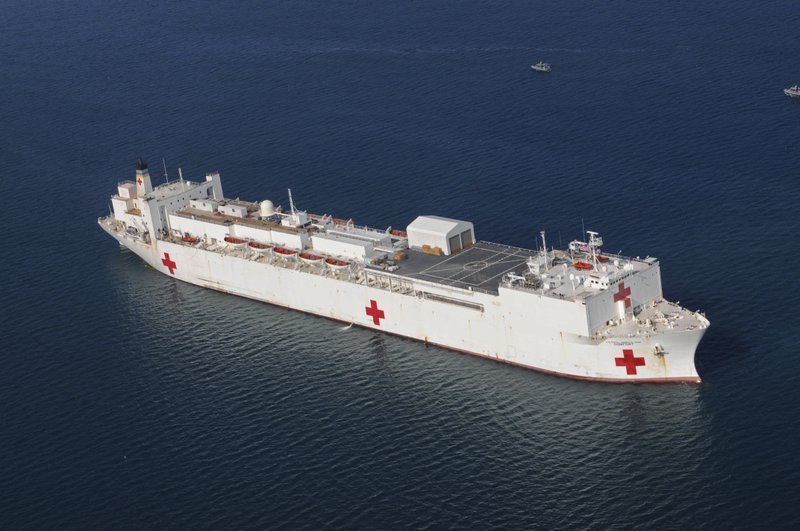A 1,000-bed Navy hospital ship will be sent to New York to relieve pressure on hospitals bracing for an expected surge in coronavirus patients, officials announced Wednesday.
The USNS Comfort, which was sent to New York after the Sept. 11, 2001, terrorist attacks, would bolster the health care system by treating non-coronavirus patients while hospitals treat people with COVID-19.
The Comfort’s planned deployment comes as New York City-area hospitals are clearing out beds, setting up new spaces to triage patients and urging people with mild symptoms to consult health professionals by phone or video chat instead of overrunning emergency rooms.
The Navy said in a statement that it was “working to complete scheduled maintenance cycles and identify necessary medical staffing to deploy as soon as possible.” It’s not clear when it would arrive.
Virus cases in the state topped 2,300 Wednesday, with at least 20 deaths. Gov. Andrew Cuomo warned that demand for hospital beds could soon outstrip capacity by tens of thousands as the outbreak surges to an expected peak in 45 days.
For most people, COVID-19 results in only mild or moderate symptoms, such as fever and cough, but severe illness is more likely in the elderly and people with existing health problems. Worldwide, the disease has killed several thousand people, though tens of thousands who got it have recovered.
At Mount Sinai Health System’s emergency rooms, the numbers of people turning up with respiratory complaints “have increased dramatically” in recent days, said Dr. Brendan Carr, the chair of emergency medicine. Most have mild to moderate symptoms but are looking for tests and answers, he said, and the increase has been offset somewhat by a drop in other patients and moves to devote additional space and staff to emergency rooms.
Elsewhere, people have shown up demanding to be tested even when they haven’t shown any symptoms. Because testing capacity is still limited, merely showing up to an emergency room doesn’t guarantee a coronavirus test, said Dr. Robert Femia, the head of emergency medicine at NYU Langone Health.
Mayor Bill de Blasio pleaded Tuesday with people who suspect they have coronavirus symptoms to stay home and see if they improve in a few days before even calling a doctor.
“Do not go to the emergency room unless it is a true, immediate and urgent emergency,” the Democrat said.
Cuomo is meeting with U.S. Army Corps of Engineers officials Wednesday after calling on the agency to build temporary hospitals in the state. Defense Secretary Mark Esper said in an interview on Fox News that he had given the governor “my full commitment that we would get the Corps of Engineers up there soonest, to assess the problem and see how we can help out.”
Hospital officials expect a surge in cases to start in the next week or two. They’re getting ready by canceling elective surgeries — as the city has ordered — and freeing up space by discharging patients who are well enough to recover at home.
“Right now, the volume in our emergency departments is pretty manageable,” said Northwell Health spokesman Terence Lynam. “This is really the calm before the storm.”
At Brooklyn Hospital Center, people who suspect they have the virus will be directed starting Wednesday to a tent for screening to determine whether they need testing. Northwell, which runs hospitals, walk-in clinics and doctor offices, is looking to set up similar screening near its emergency room in Manhasset, on Long Island.
NYU Langone Health, which has several hospitals in the region, is steering about 1,000 patients a day to video-based consultations known as telemedicine.
Building on a model that debuted in a coronavirus hotspot north of the city, the state is opening more drive-through test sites. Laboratories are boosting test capacity and speed, and some hospitals are adjusting criteria for testing.
At Northwell Health, people are now eligible if they’re hospitalized and sick or symptomatic and believe they were exposed to the virus. Before this week, they had to have had contact with a diagnosed person.
“We have done a lot, a lot, a lot to prepare, and right now, we are managing,” said Mount Sinai’s Carr. “The next couple of weeks will be determined, I think, by how effectively we social distance and how effectively we stop spreading this to each other.”
(AP)












One Response
WHAT IS WRONG WITH THE COFFEE ROOM! IT SAYS 404 ERROR PAGE NOT FOUND.